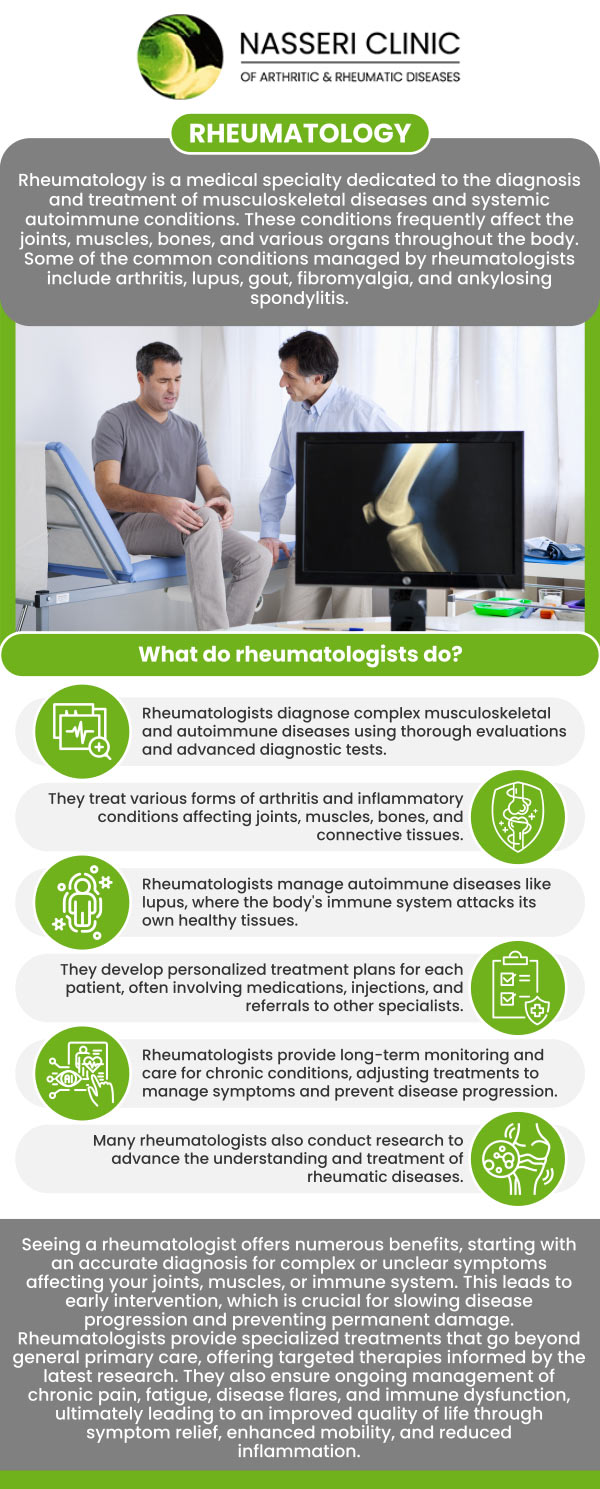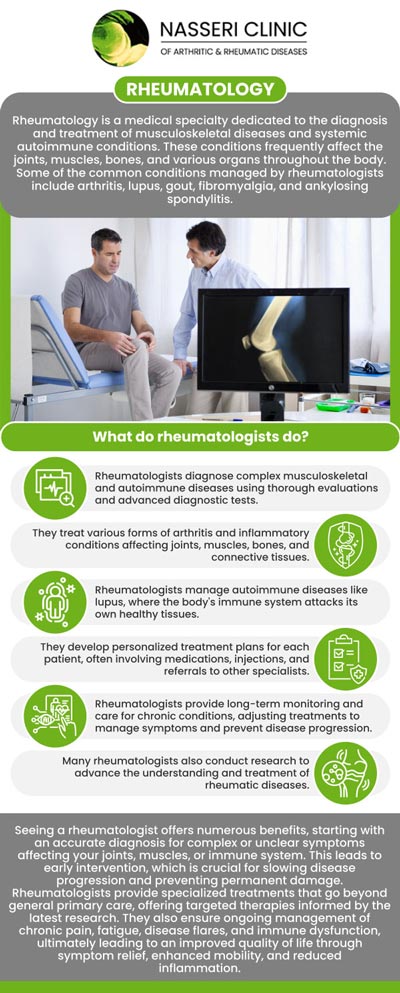Rheumatologists: What They Do and How They Can Help
Rheumatologists are specialists focused on diagnosing and treating conditions that affect the joints, muscles, and bones. To manage chronic pain or prevent further damage, visit our experienced rheumatologists to improve mobility and quality of life. For more information, contact us or request an appointment online. We have convenient locations in Catonsville, Glen Burnie, Columbia, Rosedale, Edgewater, North Baltimore, MD.




Table of Contents:
How do rheumatologists differentiate between various types of arthritis?
What role do rheumatologists play in managing complex autoimmune disorders?
How do rheumatologists monitor and adjust long-term treatment plans?
How do rheumatologists assess inflammation levels in the body?
At Nasseri Clinic of Arthritic and Rheumatic Diseases, our expert rheumatologists utilize a comprehensive diagnostic approach to accurately identify and differentiate among various arthritic and rheumatic conditions. This personalized evaluation combines detailed patient history, meticulous physical examinations, advanced imaging techniques, and targeted laboratory testing to ensure precise diagnosis and tailored treatment plans.
By carefully assessing the timing, duration, and distribution of symptoms, we can effectively distinguish inflammatory arthritis conditions such as rheumatoid arthritis, psoriatic arthritis, or gout from non-inflammatory forms like osteoarthritis.
During your physical examination, our specialists carefully evaluate joint mobility, swelling, warmth, redness, tenderness, and symmetry. For example, rheumatoid arthritis commonly involves symmetrical swelling of small joints in the hands and wrists, whereas osteoarthritis typically presents asymmetrically, primarily affecting weight-bearing joints such as knees and hips. Identifying these subtleties helps our clinicians pinpoint your specific condition accurately.
In certain cases, advanced imaging techniques such as ultrasound may be employed to detect early inflammation, synovitis (joint lining inflammation), and subtle changes not visible on traditional radiographs.
Our diagnostic process also includes sophisticated laboratory assessments. Blood tests performed at Nasseri Clinic detect inflammatory markers like erythrocyte sedimentation rate (ESR) and C-reactive protein (CRP), which tend to be elevated in inflammatory arthritis. Specialized autoantibody tests, such as rheumatoid factor (RF) and anti-cyclic citrullinated peptide (anti-CCP), help confirm rheumatoid arthritis, while elevated uric acid levels can indicate gout. Additionally, genetic markers like HLA-B27 testing help diagnose conditions such as ankylosing spondylitis and other spondyloarthropathies.
By integrating your medical history, physical examination findings, advanced imaging results, and comprehensive laboratory testing, the rheumatologists at Nasseri Clinic of Arthritic and Rheumatic Diseases ensure accurate, timely diagnoses. This personalized and thorough approach allows us to develop the most effective, individualized treatment plans, ensuring optimal outcomes and improved quality of life for every patient.
At Nasseri Clinic of Arthritic and Rheumatic Diseases, our experienced rheumatologists play a vital role in diagnosing, treating, and managing complex autoimmune and rheumatic disorders. With specialized training and extensive expertise, our medical professionals focus on conditions affecting the joints, muscles, bones, and connective tissues, as well as systemic autoimmune diseases like rheumatoid arthritis, lupus, scleroderma, vasculitis, and Sjögren’s syndrome. This advanced knowledge enables our team to recognize subtle and overlapping symptoms, ensuring accurate and timely diagnoses for our patients.
Once a diagnosis is established, Nasseri Clinic rheumatologists design personalized and comprehensive treatment plans tailored specifically to each patient’s unique health needs. We employ a collaborative and multidisciplinary approach, working closely alongside a network of healthcare providers to deliver exceptional and coordinated care. This integrated approach ensures all facets of a patient’s health are addressed, ultimately leading to improved outcomes and enhanced quality of life.
Our specialists prescribe and closely monitor specialized medications, such as immunosuppressants, biologics, and anti-inflammatory drugs. They regularly assess treatment effectiveness, adjusting medications as needed while carefully monitoring for potential side effects and complications. Additionally, our rheumatologists prioritize patient education, empowering individuals with knowledge about their conditions, and guiding lifestyle modifications, self-management techniques, and preventive strategies to minimize disease progression and complications.
At Nasseri Clinic of Arthritic and Rheumatic Diseases, our rheumatologists are dedicated to providing comprehensive, patient-centered care through meticulous monitoring and personalized treatment plans. With regular clinical assessments, we closely evaluate each patient’s symptoms, joint functionality, and overall quality of life, carefully tracking any progression or changes in arthritic and rheumatic conditions. Using evidence-based, standardized assessment tools, we objectively measure disease activity and patient wellness, ensuring accurate monitoring of each patient’s disease course.
To support our clinical evaluations, Nasseri Clinic employs advanced diagnostic procedures, including blood tests and state-of-the-art imaging techniques such as X-rays, ultrasounds, and MRIs. These diagnostics help our specialists visualize and monitor joint inflammation, structural changes, and damage levels accurately. Additionally, routine laboratory tests—including liver and kidney function assessments, complete blood counts, and inflammatory markers—are regularly conducted to identify and manage potential medication side effects proactively.
Armed with this detailed clinical data, our rheumatologists carefully tailor each patient’s treatment regimen. Adjustments may involve modifying medication dosages, transitioning between therapies, introducing innovative treatment approaches, or safely discontinuing medications when appropriate. At Nasseri Clinic, patient feedback, thorough clinical evaluations, and comprehensive monitoring guide all therapeutic decisions, ensuring that each treatment plan remains optimized and personalized to meet the unique health needs and conditions of our valued patients.
At Nasseri Clinic of Arthritic and Rheumatic Diseases, our expert rheumatologists use a comprehensive approach to assess and manage inflammation in arthritic and autoimmune conditions. We combine clinical evaluation, advanced laboratory tests, and state-of-the-art imaging techniques to accurately diagnose and monitor disease activity.
Our specialists begin with a thorough medical history and physical examination, assessing joint swelling, tenderness, warmth, redness, and limited mobility. This helps identify inflammation early for timely intervention. Laboratory tests, including ESR, CRP, and specific autoantibodies like rheumatoid factor and ANA, provide essential information to guide treatment.
We also utilize advanced imaging, such as ultrasound and MRI, to detect inflammation and monitor disease progression. These techniques complement traditional X-rays, allowing for early detection and proactive treatment.
Patient input is crucial; we use specialized questionnaires to assess pain, fatigue, stiffness, and functional limitations. By combining patient-reported insights with clinical findings, we achieve a holistic understanding of each patient’s condition.
At Nasseri Clinic, our goal is to provide personalized, compassionate care, ensuring accurate diagnoses and optimized treatment outcomes for those with arthritic and rheumatic conditions. For more information, contact us or book an appointment online. We have convenient locations to serve you in Maryland. We serve patients from Catonsville MD, Glen Burnie MD, Columbia MD, North Baltimore MD, Rosedale MD, Edgewater MD, Hebbville MD, Woodlawn MD, Pasadena MD, Jacobsville MD, Ellicott City MD, Laurel MD, Dundalk MD, Halethorpe MD, Overlea MD, Parkville MD, Riva MD, Annapolis MD, Ferndale MD, and surrounding areas.
Check Out Our 5 Star Reviews


Additional Services You May Need

Additional Services You May Need
▸ Arthritis Care
▸ Infusion Therapy
▸ Lab Services
▸ Radiology
▸ NCARD NRACE
▸ BioFlex Laser Therapy
▸ Ultrasound Guided Injection
▸ NCARD PRP
▸ NCARD Myers
▸ Rheumatology
▸ Myositis
▸ Osteoporosis
▸ Ulcerative Colitis
▸ Multiple Sclerosis
▸ Saphnelo Infusion
▸ Injection Treatments
▸ Intravenous Immunoglobulin Therapy
▸ Asthma
▸ Crohn’s Disease
▸ Fibromyalgia
▸ Infusion Therapy for Gout
▸ Inflammatory Eye Disease
▸ Inflammatory Skin Disease
▸ Vasculitis
▸ Iron Deficiency
▸ Lupus


